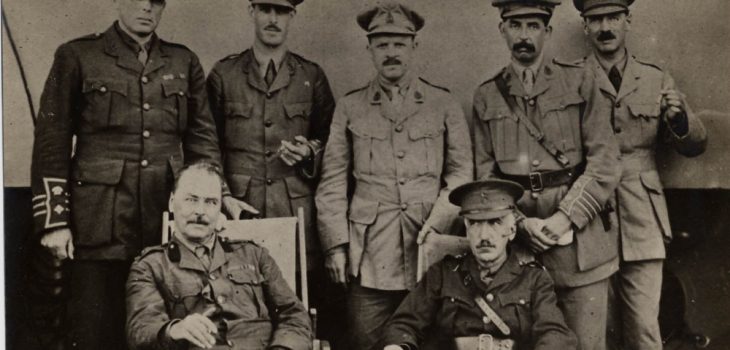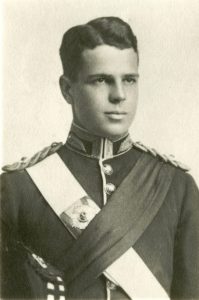Throughout his life, Ross’ poems focused on subjects close to his heart, like the devastation of malaria as seen in Indian Fevers:
Indian Fevers
In this, O Nature, yield I pray to me.
I pace and pace, and think and think, and take
The fever’d hands, and note down all I see,
That some dim distant light may haply break.
The painful faces ask, can we not cure?
We answer, No, not yet; we seek the laws.
O God, reveal thro’ all this thing obscure
The unseen small, but million-murdering cause.
Written before his discovery in 1897, Indian Fevers demonstrates the frustration of Ross unable to help those who have been inflicted with malaria, knowing that discovering the cause of the disease can help with prevention.
Ross in 1917, with the poem, ‘The Anniversary’, but here, Ross looks at how the world has forgotten the importance of his discovery and the lives it has saved since:
The Anniversary
Now twenty years ago
This day we found the thing;
With science and with skill
We found; then came the sting –
What we with endless labour won
The thick world scorned:
Not worth a word to-day-
Not worth remembering.
O Gorgeous Gardens, Lands
Of beauty where the Sun
His lordly raiment trails
All day with light enspun,
We found the death that lurk’d beneath
Your purple leaves,
We found your secret foe,
The million-murdering one;
And clapp’d our hands and thought
Your teeming width would ring
With that great victory – more
Than battling hosts can bring.
Ah, well-men laugh’d. The years have
Pass’d;
The world is cold –
Some million lives a year,
Not worth remembering!
Ascended from below
Men still remain too small;
With belly-wisdon big
They fight and bite and bawl,
These larval angels! –but when true
Achievement comes-trifling doctor’s matter-
No consequence at all!
Ross also wrote extensively about the First World War, in his poems, ‘Duty’, ‘Farewells’, ‘Black August’, and ‘Apocalypse’, poems about the devastation of war and the loss it brought. Yet, it is his poem, ‘The Father’, written in 1918, that shows us Ross’ personal loss. In 1914, Sir Ronald Ross’ third child, Ronald Campbell Ross, 2nd Lieutenant in The Royal Scots (Lothian Regiment), 2nd Battalion, died on 26th August at the : he was 19 years old.
The Father
Come with me then, my son;
Thine eyes are wide for truth:
And I will give thee memories,
And thou shalt give me youth.
The lake laps in silver,
The streamlet leaps her length:
And I will give thee wisdom,
And thou shalt give me strength.
The mist is on the moorland,
The rain roughs the reed:
And I will give thee patience,
And thou shalt give me speed.
When lightings lash the skyline
The shalt thou learn thy part:
And when the heav’ns are direst,
For thee to give me heart.
Forthrightness I will teach thee;
The vision and the scope;
To hold the hand of honour:-
And thou shalt give me hope;
And when the heav’ns are deepest
And stars most bright above;
May god then teach thee duty;
And thou shalt teach me love.
I dream’d, a wintry sunlight
Fill’d all the misted air,
And through the golden dead leaves
My son and I walk’d there,
And said, “We twain together
Will turn the fateful page;
And I will give thee all things
And thou shalt warm mine age.”
But sudden an Angel stood there
And took his hand from mine;
The chill mist damp’d and darken’d;
They faded line by line.
The Angel cried in anger,
“Thou shalt not lead, but I;
Ye old men make the evils
Whereof the young men die.”
A stronger hand than mine, son,
Shall guide – a greater truth:
And I will keep rememberance,
And thou shalt – keep thy youth.
The lake laps in silver,
The streamlet leaps her length:
And I have still my wisdom,
But thou, not thou, thy strength.
The fog fills the moorland,
The wind whips the reed:
And I have still more patience,
But where is now thy speed?
The heav’ns are the blackest,
The stars hid above:
Oh, God hath taught thee duty,
More deep than any love.
Cold, cold November,
Tell me why thou are so sad.
“When leaves are falling,
Shall I then, or thou, be glad?”
Why sigh so often,
All ye passing gusts of wind?
“For the pale and beauteous,
We have left, and thou, behind.”
Why weep ye, grey clouds,
O’er the black and blasted heath?
“For the cold and beauteous,
That we see, and thou, beneath.”
Cold, cold, they lie there,
There our noble dear son lie;
But, hear ye Angels,
Did they not die in honour?
Cold, cold, the answer
From the mocking mistral came,
“They died in glory;
But their glory is your shame.”








